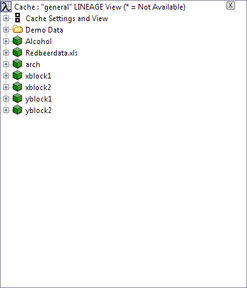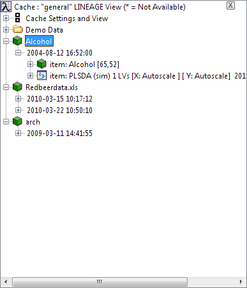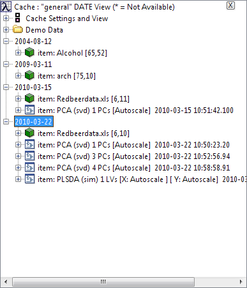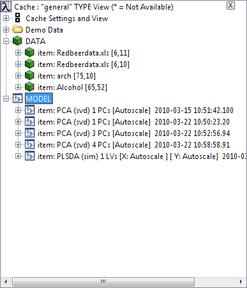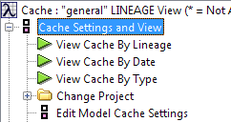Analysis Window: Model Cache Pane: Difference between revisions
imported>Jeremy No edit summary |
imported>Jeremy No edit summary |
||
| Line 19: | Line 19: | ||
Multiple options are available to you for changing the Model Cache view, managing your cache, and manipulating cache items. See: | Multiple options are available to you for changing the Model Cache view, managing your cache, and manipulating cache items. See: | ||
* [[AnalysisWindow_ModelCachepane#Model Cache pane view|Model Cache pane view]]. | |||
* [[AnalysisWindow_ModelCachepane#Model Cache pane view | |||
* [[AnalysisWindow_ModelCachepane#Cache management|Cache management]]. | * [[AnalysisWindow_ModelCachepane#Cache management|Cache management]]. | ||
* [[AnalysisWindow_ModelCachepane#Manipulating cached items|Manipulating cached items]]. | * [[AnalysisWindow_ModelCachepane#Manipulating cached items|Manipulating cached items]]. | ||
===Model Cache pane view=== | ===Model Cache pane view=== | ||
| Line 50: | Line 28: | ||
The options to change the Model Cache pane view are found in two locations: | The options to change the Model Cache pane view are found in two locations: | ||
* In the Model Cache pane itself under Cache Settings and View | * In the Model Cache pane itself under Cache Settings and View | ||
* On the Tools menu (the View Cache option) for the Analysis windows | * On the Tools menu (the View Cache option) for the Analysis windows | ||
:''Options to change the Model Cache pane view'' | :''Options to change the Model Cache pane view'' | ||
::[[Image:Model_cache_settings_options.png|171x56px]] | ::[[Image:Model_cache_settings_options.png|171x56px]] | ||
You can select from three different organizational views: | You can select from three different organizational views: | ||
* View Cache by Lineage-In the View Cache by Lineage view, the cache items are sorted by the parent data item. Under the parent data item, the child items (modified data, model, and predictions) are sorted by the timestamps at each modification point. | * View Cache by Lineage-In the View Cache by Lineage view, the cache items are sorted by the parent data item. Under the parent data item, the child items (modified data, model, and predictions) are sorted by the timestamps at each modification point. | ||
:''View Cache by Lineage view'' | :''View Cache by Lineage view'' | ||
::[[Image:Model_cache_view_lineage.png|247x288px]] | ::[[Image:Model_cache_view_lineage.png|247x288px]] | ||
* View Cache by Date-In the View Cache by Date view, all cached items are simply sorted by creation date in chronological order. | * View Cache by Date-In the View Cache by Date view, all cached items are simply sorted by creation date in chronological order. | ||
:''View Cache by Date view'' | :''View Cache by Date view'' | ||
::[[Image:Model_cache_view_date.png|247x288px]] | ::[[Image:Model_cache_view_date.png|247x288px]] | ||
* View Cache by Type-In the View Cache by Type view, all cached items are simply sorted by object type-data, model, or prediction. | * View Cache by Type-In the View Cache by Type view, all cached items are simply sorted by object type-data, model, or prediction. | ||
:''View Cache by Type view'' | :''View Cache by Type view'' | ||
::[[Image:Model_cache_view_type.png|247x288px]] | ::[[Image:Model_cache_view_type.png|247x288px]] | ||
===Cache management=== | ===Cache management=== | ||
Revision as of 11:53, 19 August 2010
Table of Contents | Previous | Next
Analysis window Model Cache pane
Data that is used to create models and predictions during data analysis as well as all of the models and predictions created from this data is automatically cached. After a model is created, the model and the data used to create it are added to the cache. If new data is loaded and a prediction is made, this new data and the prediction are added to the cache. Every time you edit data and create a new model or prediction from the data, each version of the modified data and the corresponding model or prediction are added to the cache. The Model Cache pane displays this complete history of all your cached items-all of the data that was used to create models and predictions during data analysis as well as all of the models and predictions that were created from this data-in a hierarchical view.
- Analysis window Model Cache pane
Note: By default, the Model Cache pane is turned on when Solo first opens. You can close the Model Cache pane by clicking the Close ("X") button in the upper right hand corner of the pane. To turn the Model Cache on again, on the Tools menu on the Analysis window, click View Cache, and then select a viewing option. Models and data are cached even if the Model Cache pane is not open.
Multiple options are available to you for changing the Model Cache view, managing your cache, and manipulating cache items. See:
Model Cache pane view
The options to change the Model Cache pane view are found in two locations:
- In the Model Cache pane itself under Cache Settings and View
- On the Tools menu (the View Cache option) for the Analysis windows
- Options to change the Model Cache pane view
You can select from three different organizational views:
- View Cache by Lineage-In the View Cache by Lineage view, the cache items are sorted by the parent data item. Under the parent data item, the child items (modified data, model, and predictions) are sorted by the timestamps at each modification point.
- View Cache by Lineage view
- View Cache by Date-In the View Cache by Date view, all cached items are simply sorted by creation date in chronological order.
- View Cache by Date view
- View Cache by Type-In the View Cache by Type view, all cached items are simply sorted by object type-data, model, or prediction.
- View Cache by Type view
Cache management
Several options are available to you for managing your cache. You can modify all of these options in the Options dialog box.
Note: For a detailed discussion about the Options dialog box, see Options dialog box.
| 1. | Do one of the following: |
|
- Cache Settings and View options
|
- The Options dialog box for the Model Cache pane opens.
- Options dialog box
| 2. | Modify the value for any option, and then click OK. |
- The Options dialog box closes and you return to the Model Cache pane. Any changes that you made are effective immediately.
|
Option |
Description |
|
cache |
Controls the operation of the cache. "On" records all data, models, and predictions. "readonly" locks down the cache and prevents recording to the cache and clearing of the cache. |
|
cachefolder |
Specifies the folder in which all of your cached information is stored. By default, the cached items that do not exceed the maxdatasize value (see maxdatasize below) are stored automatically in your system's TEMP folder and remain in this folder as long as they do not exceed the maxage value. (See maxage below.) For all operating systems other than Macintosh (a "Mac"), this means that even if you close Solo (or crash and reboot your computer, or just reboot your computer), the cached items are immediately available when you restart Solo or your computer. Note: If you are running Solo on a Mac, the first time that you cache an item, you are prompted to choose a folder other than the TEMP folder. Because the TEMP folder is sometimes deleted when you restart a Mac, if you are running Solo on a Mac, you should specify a different setting for your cachefolder. |
|
project |
Specifies an optional subfolder within the cachefolder for holding the cached items. The default name for project is "general." You can use the project setting to separate cached items among different work projects. Note: No option is available in Solo to delete a project folder after you create it. You can delete old project folders only by manually locating the project folder on your computer and deleting the folder. Note: You can also change value for the project setting using the Change Project option under Cache Settings and View in the Model Cache pane. |
|
maxage |
The maximum number of days an item is saved in the cache. An item that is older than this value is permanently deleted from the cache. Note: See "Manipulating cached items" below for information about saving cached items to a location other than the cachefolder. |
|
maxdatasize |
Specifies the maximum size of a data item (in total number of table elements) that can be stored in the cache. |
Manipulating cached items
You can right-click on an entry for a cached item Model Cache pane to open a context menu that contains options for manipulating the item.
|
Menu Option |
Description |
|
Load Item |
Loads the selected cached item into the Analysis window. By default, if no data is loaded into the Analysis window, then the cached item is loaded into the X calibration component; otherwise, you are prompted to override the loaded data or load the data to another location. Note: You can also double-click a cached item to load it into the Analysis window. |
|
Show Item |
Opens and displays the selected item in a separate window-either the DataSet Editor window or the Model Reader window. |
|
Save Cached Item As |
Save the cached item to the workspace or to a file. |
|
Open in New Window |
Opens the cached item in a new Analysis window. |
|
Rename |
Rename the cached item. |
